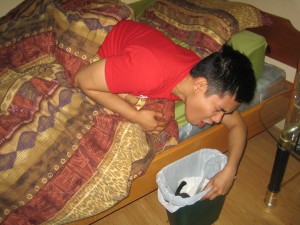Impacted colon is the inability to pass stools and caused by accumulation of feces in the rectum which interferes with regular bowel movement, and there is a high risk that the intestines can be damaged if feces are not removed in time.
The condition is also fecal impaction and due to obstruction of the colon, which can result in chronic disability to pass out stools. Impacted colon can be in the form of chronic constipation and can have symptoms such as vomiting, nausea and abdominal distention. Impacted colon is a serious condition that can be caused by other disorders such as diabetes, cancer of the colon and cardiac disorders.
Causes of impacted colon
- Low intake of water or fluids in the diet has a high possibility of resulting to an impacted colon.
- Low intake of dietary fiber
- Taking medications such as antihistamines or anticholinergic medications that can cause drying up of intestinal fluids or slows down the natural peristaltic movement can put the individual at high risk of developing impacted colon.
- Conditions such as diabetes that cause nerve damage and result in peristalsis can cause impacted colon. Peristalsis is the muscle contraction that moves the food in different processing stations found in the digestive tract.
- Suffering from a long term illness or had a major surgery can affect the peristalsis and digestive functions of the intestines and cause impacted colon.
- Tumor or cancer of the intestines

Symptoms
- Episodes of constipation
- Nausea and vomiting with retrosternal burning and loss of appetite.
- The rectum is bleeding that can be due to piles or excessive straining
- Sometimes, the affected person may feel fatigued, tired along with fever
Treatment and home remedies
- Lifestyle and dietary changes is necessary if suffering from impacted colon. It is vital to increase the consumption of dietary fiber and maintain proper hydration.
- Avoid eating processed and refined foods which is difficult to properly digest in order to minimize the risk of colon impaction.
- Avoid drinking coffee and tea since they can cause dehydration and puts the individual at high risk for constipation.
- Perform regular exercises in order to help improve the circulation of blood to the intestines and improves intestinal peristalsis.
- Add ginger and mint in the diet to improve gastric motility and minimize symptoms by constipation. If possible, the consumption of fennel seeds should be increased in the diet.
- Eat cleansing diets such as fresh fruits and vegetables, brown rice and whole grains. Avoid eating animal products temporarily such as butter, milk, eggs, and meats.
- Take a long brisk walk every day and perform moderate to vigorous exercises such as jogging, biking, aerobics and power walking for at least 30 minutes. This helps with the improvement of digestion, increased energy and improves lymphatic fluid movement throughout the body. Performing exercises can help lessen stress which can contribute to the development of constipation.
FACT CHECK
https://www.medicalnewstoday.com/articles/322150.php
https://www.webmd.com/digestive-disorders/what-is-fecal-impaction#1
